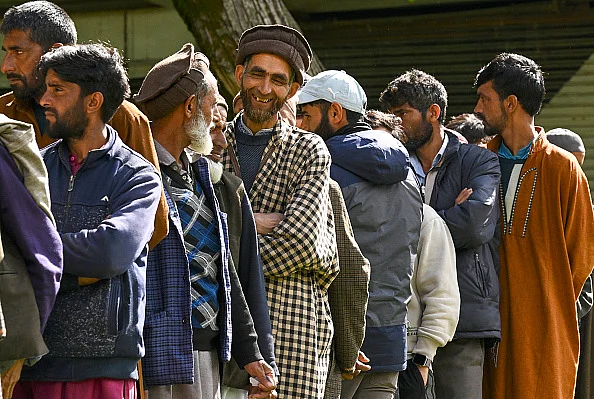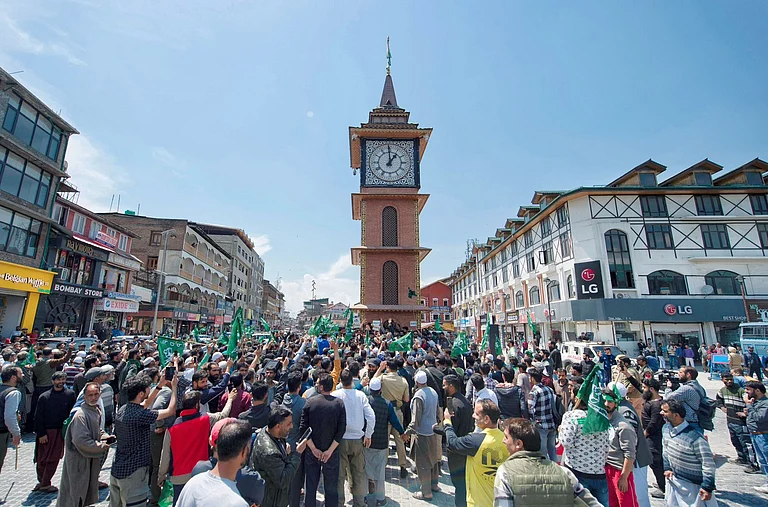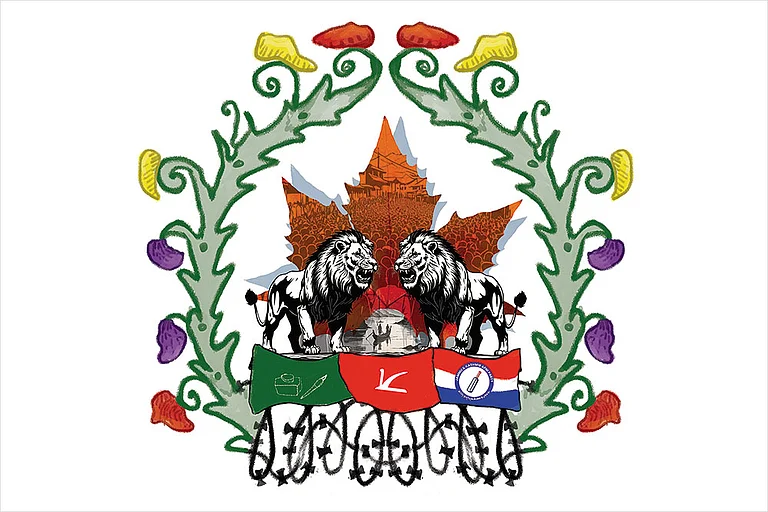In the midst of the ever-twisting political storm that seems to have made Kashmir as a preferred playground, it's hard not to notice some characters adding a touch of humor to the otherwise jittery atmosphere. Yes, I am talking about those satirical persons from various political parties who randomly provide us with some much-needed comic relief, thus unveiling the satirical circus of Kashmir Politics. The hustle and bustle of election campaigning has transformed the streets of Kashmir into a battleground, with mainstream political parties competing for the coveted title of "Asli Shera" (Real Tiger). Each day brings forth a display of competition as parties endeavour to outshine one another in the eyes of the public. On the day of nomination filing, the road outside the DC office in Srinagar was alive with the thunderous chants of "Nakli Shera watsadera, Asli Shera aa gaya" (No place for Fake tigers as the Real Tiger has arrived). Supporters from all political factions echoed this sentiment, leaving bystanders perplexed as to who truly deserves the title of the Real Tiger. Amidst this fervent contest, it's not just the mainstream leaders who command attention, but also the satirical characters lurking in the shadows of their larger-than-life personas. Each political party seems to have its own comedic counterpart, adding an extra layer of romance to the already chaotic political landscape.
The Comic Relief Brigade: Kashmir's Air Of Political Satire And Its Folly Subsidiaries
Amidst Kashmir's charged political landscape, a cast of satirical characters from various parties offers a dose of comic relief, unveiling the region's vibrant culture of political humor.

First off, we have the "Master clown", Fayaz Ahmed alias Fayaz Scorpio now Fayaz Tiger. This character, a Deputy Sarpanch from Lysar Rafiabad, in Baramulla is a true magician, adept at inviting attention towards issues with sleight of hand. Whenever a contentious topic surfaces, one can count on Fayaz Tiger to have a new trick up his sleeve to captivate the audience. Whether it's attributing power outages to extraterrestrial interference or suggesting the transfer of uncooperative officers to Ladakh, his antics never fail to entertain and fascinate. But Fayaz Tiger is more than just a comedian; he's a social media sensation with his own unique take on what constitutes a true Shera (tiger). When asked about his views on Omar Abdullah, he famously quipped, "Wo boodha hai" (That tiger has turned old), showcasing his quick wit and sharp tongue. Fayaz may long reign as the Sultan of Satire in this political circus.
Then there's the "Statement King", Mohd Shafi alias Babbar Sher. This character can turn even the most mundane statement into an appealing chant that echoes through the valleys making him nothing short of legendary and making his statements as memorable as they are nonsensical. Sometimes, it feels like they're competing in a battle of wits to see who can come up with the most absurd tagline. Mohd Shafi, famously known as Babbar Sher, deserves a spotlight in the colorful cast of Kashmiri politics. Whether he's addressing a crowd or speaking to the media, one can bet that his words will resonate far and wide. From the poetic to the downright nonsensical, there's no limit to his creativity. But amidst the humor and the theatrics, there's a deeper message underlying Babbar Sher's statements. Behind the catchy taglines and the playful banter lies a passionate advocate for the people of Kashmir, someone who isn't afraid to speak his mind and challenge the status quo. In a political landscape often disfigured by seriousness and tension, Babbar Sher serves as a refreshing reminder that laughter and gaiety have their place too.
Let's not forget the "No wada Kiya Lady", Falak Jaan from Apni Party. A latest social media sensation, she has a natural skill for putting a positive spin on even the direst of situations. Whether it is highlighting the dancing skills of Farooq Abdullah or some corruption scandal, she finds a way to make it sound like a terrific victory for her party. Earlier a staunch supporter of Baji (Mehbooba Mufti) for quite some time, lately reassessed her political allegiances. It's no secret that the abrogation of Article 370 brought about seismic changes in the region and Falak Jaan voiced her concerns about the role of the BJP in shaping the future of Kashmir. When asked about BJP's rule in Kashmir, her immediate response was a resounding "BJP No" reflecting her apprehensions and reservations. But life has a funny way of surprising us, doesn't it? In a twist of fate, Falak Jaan found herself now campaigning for Altaf Bukhari, whom she affectionately refers to as "Bhaijaan." one might wonder what prompted this change of heart. Falak Jaan’s belief about Bhaijaan is that he radiates a certain courage and determination, which she calls "Dum" or guts, that sets him apart from the rest. However, Bhaijaan's stature may be viewed differently by others. Some may see him as more of a Bhajrang(i) figure, stirring uncertainty and mixed feelings among the populace. It's understandable that not everyone may be ready to rally behind him wholeheartedly for that reason.
As the mainstream tigers engage in the electoral fray, these satirical characters play a crucial role in shaping the narrative, offering a satirical commentary on the proceedings and providing much-needed comic relief to the weary audience. In this whirlwind of this political theatrics, where the lines between reality and satire often blur, one thing remains certain: the quest for the title of "Asli Shera" rages on, with each contender determined to prove their worth in the eyes of the Kashmiri populace.
The evolution of comedy in Kashmir, particularly through social media, reflects a profound shift in the region's socio-political landscape. In a climate of shrinking spaces for dissent, satire has emerged as a powerful tool for Kashmiris to express themselves and find solace amidst adversity. The transition from a dark rumour mill to a humour mill signifies a transformation in the Kashmiri psyche—a shift from spreading baseless gossip to crafting witty commentary on the absurdities of life. Many perceive this shift as a constructive process, wherein the narrative is redirected from fear and uncertainty to laughter and resilience. Interestingly, it's not just the mainstream politicians who dominate social media with their satirical subsidiaries rather, it's the satirical characters and comedic personas that often steal the spotlight creating a symbiotic relationship between the audience and "social media" journalists who cover these humorous spectacles, resulting in a win-win situation for all involved.
For the common Kashmiri, spending time watching these satirical performances on social media provides a welcome escape from the daily grind, adding a touch of levity to their lives. However, beneath the laughter lies a deeper sentiment of frustration and disillusionment. The phrase from a famous video "Asi chuna Asi karekh Anguj" ("We Kashmiris are being fingered yet again") encapsulates this feeling of victimhood and marginalization that pervades Kashmiri society.
When it comes to the act of voting for the "Asli Shera," many Kashmiris may feel disillusioned and disengaged, choosing to abstain from the electoral process. The sentiment of "Yim Karen ne kiheen, Bea tchalawapasi" ("I am leaving back as I don't expect them to do any good for us") reflects a deep-seated distrust towards mainstream politicians and their ability to bring about meaningful change.
In these complex mosaics of humor, resilience, and disenchantment, Kashmiris continue to navigate the tumultuous waters of politics with a mixture of wit, scepticism, and hope for a better future.
Huma Javid is a law graduate with a keen interest in writing.
- Previous Story
 Marital Rape 'A Social Issue Not Legal', Centre Files Affidavit With SC Against Criminalisation
Marital Rape 'A Social Issue Not Legal', Centre Files Affidavit With SC Against Criminalisation - Next Story


























